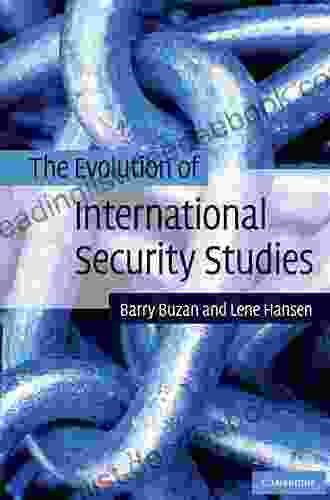The Evolution of International Security Studies

4.4 out of 5
| Language | : | English |
| File size | : | 2693 KB |
| Text-to-Speech | : | Enabled |
| Screen Reader | : | Supported |
| Enhanced typesetting | : | Enabled |
| Word Wise | : | Enabled |
| Print length | : | 400 pages |
| Lending | : | Enabled |
International security studies is a field of study that examines the causes of war and peace, and the strategies and policies that states use to achieve security. It is a relatively new field, with its origins in the early 20th century. However, it has rapidly grown in importance in recent years, as the world has become increasingly interconnected and the threats to security have become more complex.
Origins of International Security Studies
The origins of international security studies can be traced back to the end of the First World War. The war had been a devastating conflict, and it led to a widespread desire to prevent future wars. This desire led to the establishment of the League of Nations, which was the first international organization dedicated to maintaining peace. The League of Nations failed to prevent the outbreak of the Second World War, but it did help to establish the principles of international security that would be developed after the war.
Classical Realism
The classical realist school of international security studies emerged in the aftermath of the Second World War. Classical realists believe that the world is a dangerous place, and that states must be constantly vigilant to protect their security. They argue that states are the primary actors in the international system, and that they are motivated by a desire for power. Classical realists also believe that war is a natural and inevitable part of international politics.
Liberal Institutionalism
The liberal institutionalist school of international security studies emerged in the 1970s and 1980s. Liberal institutionalists believe that the world is not as dangerous as classical realists believe, and that states can cooperate to achieve security. They argue that international institutions can help to promote cooperation and reduce the risk of war. Liberal institutionalists also believe that democracy and free trade are important for promoting peace.
Constructivism
The constructivist school of international security studies emerged in the 1990s. Constructivists believe that the world is socially constructed, and that the way we think about security is shaped by our culture and history. They argue that states' identities and interests are not fixed, but are rather constructed through social interaction. Constructivists also believe that norms and values play an important role in international politics.
Critical Security Studies
The critical security studies school of international security studies emerged in the 1990s. Critical security studies scholars question the traditional assumptions of international security studies. They argue that security is not just about military power, but also about other factors such as economic security, environmental security, and human security. Critical security studies scholars also argue that the international system is not as anarchic as classical realists believe, and that there is room for cooperation between states.
Post-Structuralism
The post-structuralist school of international security studies emerged in the late 1990s and early 2000s. Post-structuralists believe that language and discourse play an important role in international politics. They argue that the way we talk about security shapes our understanding of it, and that it can be used to legitimize violence. Post-structuralists also question the traditional assumptions of international security studies, such as the idea that states are the primary actors in the international system.
Feminist Security Studies
Feminist security studies is a relatively new field of study that emerged in the 1990s. Feminist security studies scholars argue that traditional approaches to security have ignored the experiences of women and marginalized groups. They argue that security is not just about military power, but also about other factors such as sexual violence, domestic violence, and economic inequality. Feminist security studies scholars also argue that the international system is gendered, and that women are often excluded from decision-making processes.
International security studies is a rapidly evolving field of study. The field has come a long way since its origins in the early 20th century, and it is now more important than ever to understand the complex challenges to security that we face in the 21st century.
4.4 out of 5
| Language | : | English |
| File size | : | 2693 KB |
| Text-to-Speech | : | Enabled |
| Screen Reader | : | Supported |
| Enhanced typesetting | : | Enabled |
| Word Wise | : | Enabled |
| Print length | : | 400 pages |
| Lending | : | Enabled |
Do you want to contribute by writing guest posts on this blog?
Please contact us and send us a resume of previous articles that you have written.
 Book
Book Page
Page Story
Story Genre
Genre Library
Library Paperback
Paperback Newspaper
Newspaper Paragraph
Paragraph Sentence
Sentence Bookmark
Bookmark Glossary
Glossary Bibliography
Bibliography Foreword
Foreword Synopsis
Synopsis Annotation
Annotation Manuscript
Manuscript Scroll
Scroll Tome
Tome Narrative
Narrative Autobiography
Autobiography Memoir
Memoir Resolution
Resolution Librarian
Librarian Catalog
Catalog Archives
Archives Periodicals
Periodicals Study
Study Research
Research Scholarly
Scholarly Journals
Journals Reading Room
Reading Room Rare Books
Rare Books Special Collections
Special Collections Interlibrary
Interlibrary Literacy
Literacy Thesis
Thesis Awards
Awards Reading List
Reading List Theory
Theory Textbooks
Textbooks Elizabeth Starr Hill
Elizabeth Starr Hill Mary Owens
Mary Owens James W Tollefson
James W Tollefson Philip K Allan
Philip K Allan M O Kenyan
M O Kenyan David Barsamian
David Barsamian Brenda Gayle Plummer
Brenda Gayle Plummer Anna Dorn
Anna Dorn Lynn R Kahle
Lynn R Kahle John M Cooper
John M Cooper Edith Wharton
Edith Wharton Kim Komando
Kim Komando Colleen Sell
Colleen Sell Daniel K Richter
Daniel K Richter Laura Jane Williams
Laura Jane Williams Dawn Wrobel
Dawn Wrobel Pavel Ythjall
Pavel Ythjall Barack Obama
Barack Obama Cheryl L Bradley
Cheryl L Bradley R K Davenport
R K Davenport
Light bulbAdvertise smarter! Our strategic ad space ensures maximum exposure. Reserve your spot today!

 Herb SimmonsHow To Sell Without Selling: A Comprehensive Guide to Building Relationships...
Herb SimmonsHow To Sell Without Selling: A Comprehensive Guide to Building Relationships... Oliver FosterFollow ·4.2k
Oliver FosterFollow ·4.2k Ryūnosuke AkutagawaFollow ·2.3k
Ryūnosuke AkutagawaFollow ·2.3k Wade CoxFollow ·14.5k
Wade CoxFollow ·14.5k Jules VerneFollow ·8.9k
Jules VerneFollow ·8.9k Gabriel HayesFollow ·14.8k
Gabriel HayesFollow ·14.8k William ShakespeareFollow ·7.4k
William ShakespeareFollow ·7.4k Ed CooperFollow ·6.3k
Ed CooperFollow ·6.3k Efrain PowellFollow ·8.6k
Efrain PowellFollow ·8.6k

 Diego Blair
Diego BlairUnveiling Hidden Crete: A Comprehensive Review of Richard...
In the tapestry of travel literature,...

 Earl Williams
Earl WilliamsNew Addition Subtraction Games Flashcards For Ages Year
Looking for a fun...

 Julio Ramón Ribeyro
Julio Ramón RibeyroUnveiling the Nexus of Educational Politics and Social...
Education, a fundamental pillar of society,...

 Jordan Blair
Jordan BlairTrains, Planes, Ships, and Cars: The Evolution of...
Transportation...

 Derek Bell
Derek BellFalling for Rachel Stanislaki: An Unforgettable Literary...
Step into the...

 Harry Cook
Harry CookAn Introduction to Cardiac Surgery for Anesthesia...
Cardiac surgery is a specialized...
4.4 out of 5
| Language | : | English |
| File size | : | 2693 KB |
| Text-to-Speech | : | Enabled |
| Screen Reader | : | Supported |
| Enhanced typesetting | : | Enabled |
| Word Wise | : | Enabled |
| Print length | : | 400 pages |
| Lending | : | Enabled |









